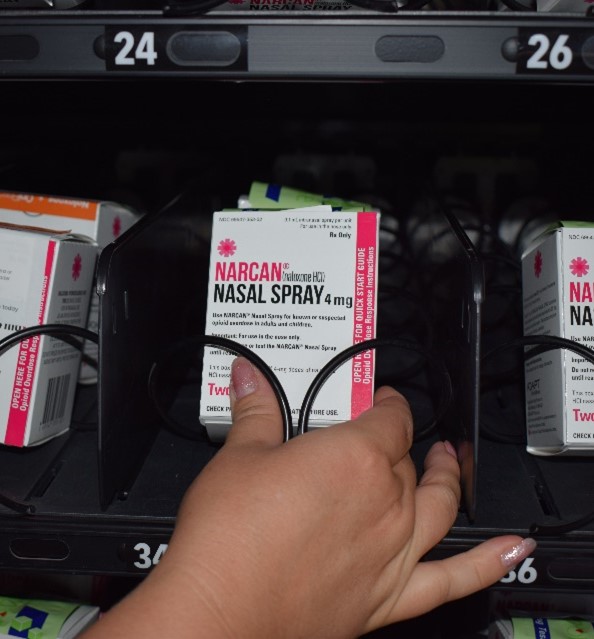Data drives Wayne County’s groundbreaking Narcan vending machine program to prevent fatal overdoses
Last week, Wayne County Executive Warren C. Evans announced a new partnership to deploy 100 vending machines containing the life-saving medication naloxone (NARCAN™) across Wayne County, Michigan. The program, led by Executive Evans and the County’s Department of Health, Human and Veteran Services, will be the single largest investment in naloxone access in U.S. history. Researchers at the Center for Behavioral Health and Justice (CBHJ) at the Wayne State University School of Social Work will be implementing the program while using a data-driven strategy that will be the first of its kind in Michigan.
“Fentanyl is a poison that’s taking lives and destroying families,” said Wayne County Executive Warren Evans. “That’s why my administration is taking the lead on fighting this deadly crisis.” Since 2013, overdose deaths have increased by 200% in Wayne County. According to the most recent certified data, in 2021, there were 902 overdose deaths, accounting for nearly 1/3 of the overdose deaths in Michigan, with 4 out 5 due to Fentanyl.
“Too often, people suffering substance abuse disorder die because they lack the means of stopping an overdose in its tracks,” said Dr. Abdul El-Sayed, Director of Wayne County’s Department of Health, Human and Veterans Services. “Naloxone is a life-saving medication, one that should be available everywhere if we’re serious about fighting this crisis”.
 CBHJ researchers will be taking a data-driven approach to determine where the machines will be placed to maximize community access and impact on overdoses. The first wave of the project involves the placement of one machine in each of the 45 cities and townships across the county to ensure every community has access. Researchers at the CBHJ will then place the remaining 55 vending machines using a variety of data, including population density data, locations of fatal opioid-involved overdoses, EMS data, and interviews with community leaders and local government. “Most overdoses – and the pain and suffering left in their wakes – are preventable if people are equipped with first-aid tools like Narcan,” said Matt Larson, CBHJ Director of Implementation. “Our goal is simple: to strategically place machines where the data shows they are most needed and can do the greatest good.”
CBHJ researchers will be taking a data-driven approach to determine where the machines will be placed to maximize community access and impact on overdoses. The first wave of the project involves the placement of one machine in each of the 45 cities and townships across the county to ensure every community has access. Researchers at the CBHJ will then place the remaining 55 vending machines using a variety of data, including population density data, locations of fatal opioid-involved overdoses, EMS data, and interviews with community leaders and local government. “Most overdoses – and the pain and suffering left in their wakes – are preventable if people are equipped with first-aid tools like Narcan,” said Matt Larson, CBHJ Director of Implementation. “Our goal is simple: to strategically place machines where the data shows they are most needed and can do the greatest good.”
“The impact of making these Naloxone vending machines easily accessible will have major impact across the county by saving lives,” said Wayne County Commission Chair Alisha Bell. In future phases of the project, the CBHJ will attempt to measure that impact through research and evaluation in a way that hasn’t been possible before. The CBHJ will be examining the extent to which a program on this scale reduces opioid-involved fatal overdoses, changes community attitudes about harm reduction, and more.
“We are thrilled to be working with Wayne County on establishing a data driven approach to implementation and impact,” said Sheryl Kubiak, Dean of the Wayne State University School of Social Work and CBHJ director. “Building on the work we’ve done placing vending machines across the state, this partnership will establish empirical evidence and demonstrate the benefits of widespread access to naloxone.”
Photo credit: Wayne County, Michigan Facebook page
About the Center for Behavioral Health and Justice: The Wayne State University School of Social Work Center for Behavioral Health and envisions communities in which research, data, and best practices are used by multiple stakeholders to enhance the optimal well-being of individuals with mental illness and/or substance use disorders who come into contact with the criminal/legal system. Learn more